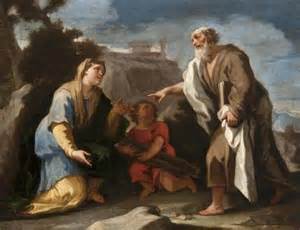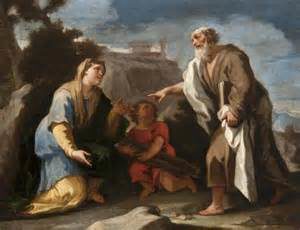Elijah and the Widow
1 Kings 17:1-16 [17-24]
Monday, Elijah and the Widow
“As the Lord the God of Israel lives, before whom I stand, there shall be neither dew nor rain these years” (1 Kings 17:1).
Climate change has altered the weather patterns in many ways. The entire state of Arizona, where I live, is classified as in a draught. California is also in a draught that is, in part, responsible for many forest fires. Though the draughts haven’t been three years in length, many of us know what it is like to have no rain and face water shortages.
There are also draughts in our spiritual lives. These are times when God seems distant and we feel that our prayers go no farther than the ceiling. St. John of the Cross coined the term, “dark night of the soul,” to describe such times. These dry times are frightening. They both try and temper our faith.
Even though God seems distant, God has promised never to abandon us. We rest in the truth that we are never out of God’s care.
Lord, thank you for your care even in the dry times of life. Please care for those people who are suffering from the effects of climate change—draughts, hurricanes and tornadoes. Amen.
Tuesday, Elijah and the Widow
You shall drink from the wadi, and I have commanded the ravens to feed you there.” (1 Kings 17:4).
Times can be tough, but somehow we get through them. We have made it through all of those difficult situations and we are alive and well today to give God thanks and praise.
During the draught, God provided water and food for the prophet. In the midst of our struggles, God has provided the resources that we needed. There were times that our family and friends supported us. On other occasions, we found the professional help that we needed. There were even those times that little miracles occurred—an unexpected check arrived in the mail, or an old friend knocked on our door. Whatever it took we were given the resources to journey through those difficult situations. We look back on our lives and give God thanks and praise for God’s provisions.
Thank you, Lord, for giving us our daily bread whatever our needs may be. We pray that you will care for the hungry and the homeless and provide for their needs. Amen.
Wednesday, Elijah and the Widow
“But after a while the wadi dried up, because there was no rain in the land” (1 Kings 17:7).
Juan had worked as an accountant at a prestigious firm for seven years. He had considered it an answer to prayer, when he was hired. There weren’t many openings for accountants at the time, and this was the job of his dream. The job had provided well for his family and him for those seven years. A merger with another firm, though, ended his dream job. Juan was let go.
Juan asked himself what he was going to do and where he was going to find another job like the one he had. He started to worry about paying the monthly bills. His anxiety escalated to panic. Juan lost sleep and lost his appetite. As he wrestled with God in prayer, God spoke to him and said, “I provided a job for you before and I will do it again. Suddenly Juan realized that he had started to put his faith in his job rather than in the Lord. It was God who provided the daily bread for his family.
The prophet was obviously disappointed that the wadi dried up and he no longer had a source of water. His survival was not dependent upon the wadi, however. It was God who provided water for him to drink and food to eat. God had not failed him in the past and God would not fail him in the future
Forgive us Lord when we become too dependent on things to provide for us, instead of placing our faith in you. Amen.
Thursday, Elijah and the Widow
“When he came to the gate of the town, a widow was there gathering sticks” (1 Kings 17:10).
The writer who recorded this story about Elijah and the widow sees God’s hand in happenstances and coincidences. A chance meeting, when Elijah entered a town, set the stage for the miraculous. Lives would be changed and a story written that would be told and retold for millennia.
The Lord moves in the warp and weft of life. We often miss observing God’s movement in our lives because we expect to see God in the bold and spectacular. Being reminded that God works in the common and everyday occurrences of our lives, we can watch and be both humbled and amazed at God’s love, grace and presence.
Lord, thank you that your hand is upon us and the lives of all your children. May your will be done one earth as it is in heaven. Amen.
Friday, Elijah and the Widow
“As the Lord your God lives, I have nothing baked, only a handful of meal in a jar” (1 Kings 17:12a).
The woman is not identified as a paragon of faith. She is not a warrior and judge like Deborah, a spunky immigrant like Ruth, a prophetess like Anna, or an obedient teenager like Mary. The woman is old, ordinary and preparing to die. Still, she demonstrates a deep faith. She offers Elijah her last morsel of food.
Many Christians have been taught that faith is seen in experiences. Faith is getting “high on Jesus” at a worship and praise service, feeling close to God at a Bible camp campfire, or enjoying the fellowship of a small group. The story of the widow reminds us that faith is demonstrated in action. Acts of generosity and expressions of love and concern proclaim that God is present and moving in our world today.
Lord, move in our lives so that all of our actions are expressions of our faith in you. Amen.
Saturday, Elijah and the Widow
“I am now gathering a couple of sticks, so that I may go home and prepare it for myself and my son, that we may eat it, and die” (1 Kings 17:12b).
The Rollins family gathered around the kitchen table. A deep sadness hung over them. Their mother had contracted Covid19. For fifteen days she had been in the hospital ICU on a ventilator. There were no improvements and her situation appeared to be hopeless.
In the apartment complex across the street, Carlos and Maria Gomez held each other close and worried about the future. Carlos had been out of work since the beginning of the pandemic. The couple had not been able to pay their rent for six months. They knew that as soon as restrictions were removed they would be evicted and homeless. To them their situation looked to be desperate.
It certainly appeared to be a hopeless situation to the widow in the story. She was gathering a few sticks for her final meal with her son. She was doing all that she could, but she had no power over the outcome of the situation.
There are times in our lives when there is no light at the end of the tunnel. At such times we can only do what we can do and then rest in God’s mercy and grace. No matter what happens God will be with us.
Lord, we cry to you, “Help!” Give us hope in our hopeless situations and the ability to rest in your love. Amen.
Sunday, Elijah and the Widow
“Elijah said to her, ‘Do not be afraid; go and do as you have said; but first make me a little cake of it and bring it to me, and afterwards make something for yourself and your son'” (1 Kings 17:13).
Elijah spoke words of comfort to the widow. “Do not be afraid,” he said. He then shared a message from the Lord that food for her and her son would not run out.
There are many people who, like the widow need to hear words of hope and encouragement. As followers of Jesus, we can share such words with the people around us. We can assure them of our love and support. We can also tell them about God’s love, grace, forgiveness and presence—and then back up that good news with our words and actions. Such words can be life changing.
Lord, give us both compassion and boldness to share your love and grace with the people around us. Amen.


